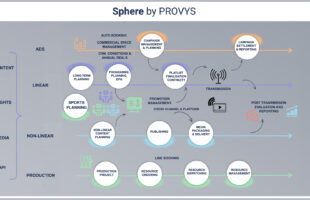What is TiVo’s plan to further leverage its presence in the Asia- Pacific region?
Sue: TiVo has a long history of working with leading CE manufacturers in Japan and Korea and is now looking to establish further relationships with partners in both countries, as well as in China. Today, TiVo works with leading companies from around the world, such as DirectTV, DISH, Fox, Google, Liberty Global, Microsoft and Vodafone, and is now working to extend its portfolio of products into Asia-Pacific. One of the first expansion milestones for TiVo in the region is with Reliance Jio in India, which selected TiVo’s CubiTV Middleware to enable advanced entertainment experiences, like unified access to linear TV with personal video recorder, video on demand (VOD), catch-up TV and network PVR content alongside access to over-the-top (OTT) services. Traditional pay-TV operators and CE manufacturers are our typical target customers. However, we also work with online video providers, broadcasters and advertising agencies to provide search and recommendation solutions as well as data analytic services on viewer behaviour. So, from our perspective, the pool of potential customers is wide.
Now that you have offices in India, Japan, Korea and Singapore, what is the strategy for Asia?
Sue: We are looking to get key flagship customers where we can showcase TiVo’s portfolio of solutions. This is the goal for the first year. TiVo’s products would be perfect for certain key platforms and broadcasters based in Singapore for a start. That would be a big step to implement a TiVo solution here. Asia is all about being able to cover the various languages. We are going to focus on the big markets first for metadata. India will be the first, as we already have English video metadata. Given our presence in Korea and Japan, it would make sense to penetrate these markets. It’s really about doing a few things well, and getting the profile within the region. So that’s the plan for the year, and to leverage our existing markets.
The voice search that was launched on Sky’s Q box is potentially an ice breaker for service providers and operators globally. How could this technology be implemented in nations that have several main languages such as Singapore (English, Malaysia, Mandarin, and Tamil)?
Sue: TiVo intends to support certain languages in Asia-Pacific for conversation services according to customer requirements, and TiVo can adapt to customer needs as needed. As background, with conversation services, TiVo makes it easier for consumers to discover entertainment by providing a voice search experience through TiVo’s Natural Language Understanding capabilities. The solution delivered by TiVo also lets consumers use their voice to search for digital entertainment across linear TV, video on demand and OTT offerings. Users can simply say what video content they are looking for and the system will apply Natural Language Understanding to help give them relevant results. The system is based on language search and highly relevant viewerspecific predictive search, which is the TiVo proprietary software called Knowledge Graph. Basically, Knowledge Graph allows viewers to intuitively search for content by using various functions and proprietary algorithms on predictive behaviours and popular searches which are trending, in order to recommend personalised content to them. The language understanding challenges in the UK will be useful in Asia, as in there are many regional accents in the UK. The power of TiVo’s conversation services is our deep understanding of entertainment, and the details behind each and every TV programme, series, film, song, cast, director and many more. This is because we understand entertainment in human terms, and not simply as unconnected entries in a database.
With turmoil in Europe and America, is TiVo’s revenue being affected in these regions?
Sue: It’s an exciting time as the media and entertainment landscape undergoes a significant evolution. The Rovi-TiVo acquisition brought together two entertainment technology leaders, joining forces to deliver the ultimate entertainment experience. And the combination of the companies’ product portfolios brings more innovative offerings to the region, while opening up new revenue and expansion opportunities in Asia.
What opportunities for growth do you see in the coming 12 months?
Sue: Through both our longestablished consumer electronics and service provider customers, as well as new relationships we are building with emerging OTT and other service providers across Asia-Pacific, the company’s extensive portfolio of innovative products and licensable technologies will be able to address the diverse needs of customers across the region – from the more developed markets like Australia and New Zealand, Japan and Korea to fast-growing nascent economies, such as India and Southeast Asia. As mentioned earlier, it’s an exciting time in media and entertainment, and TiVo is at the forefront of bringing nextgeneration experiences to life.









